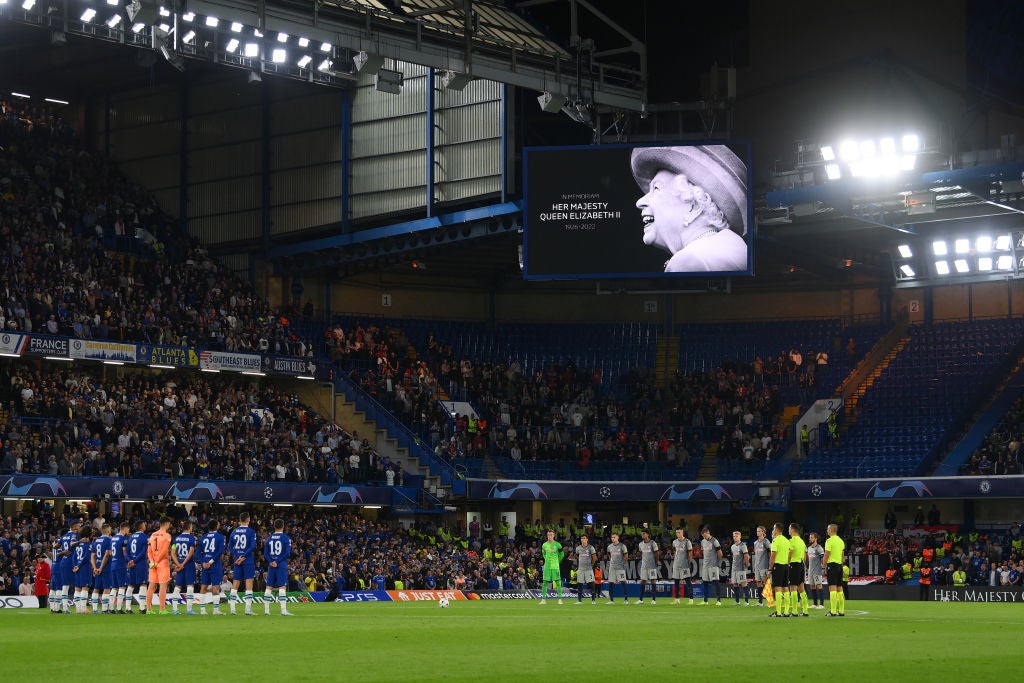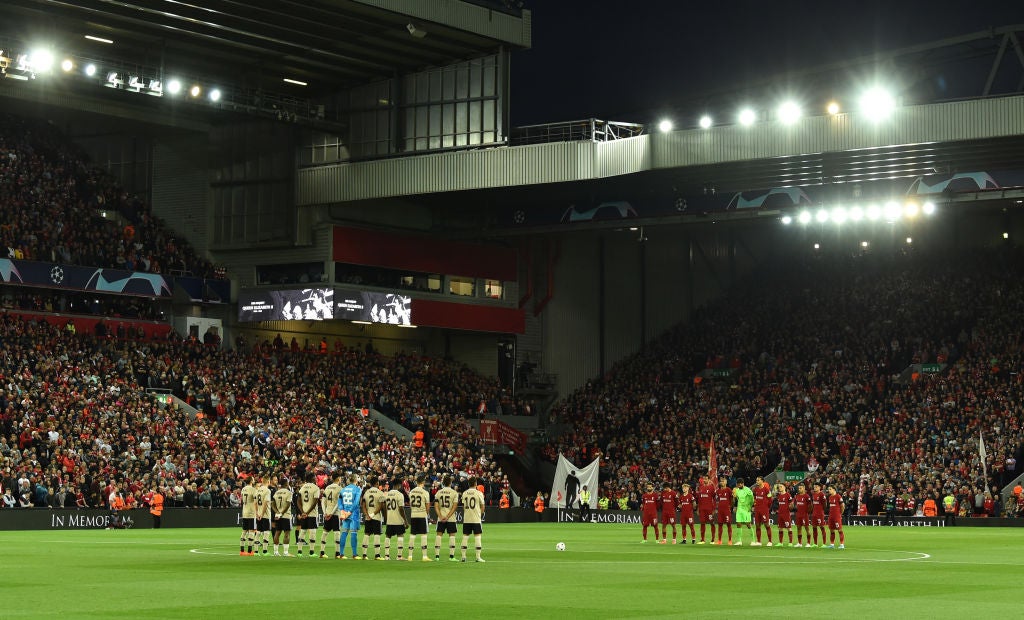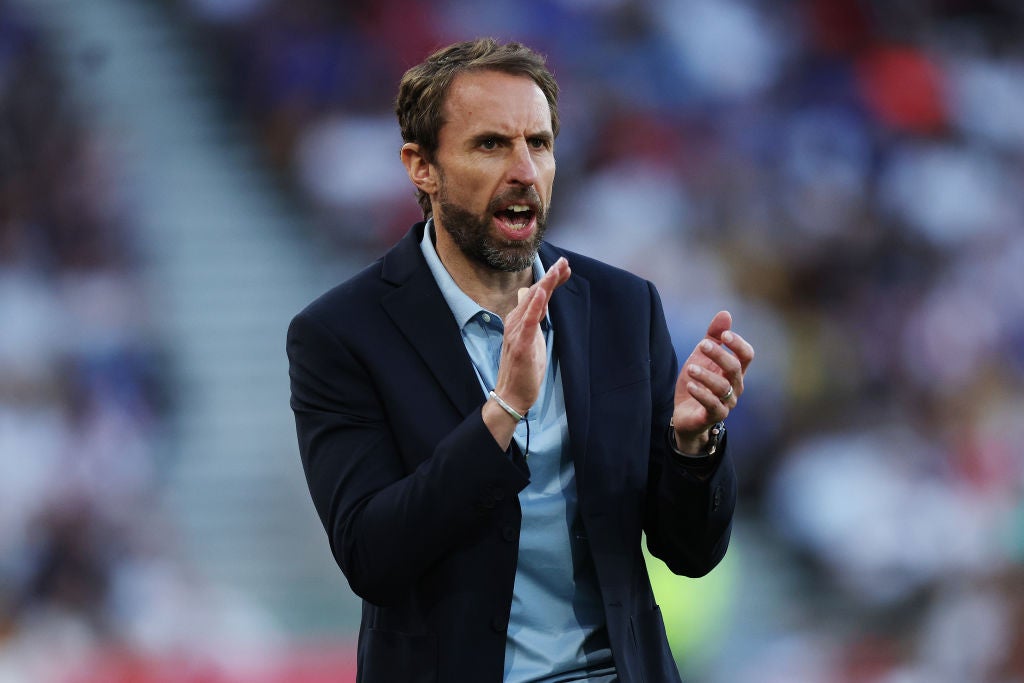‘It’s all about the brand’: How the Premier League tied itself in knots over the Queen’s death
Football wanted to make the right statement after the death of the Queen – it instead created confusion, disruption and obstacles for itself, writes Miguel Delaney


Your support helps us to tell the story
From reproductive rights to climate change to Big Tech, The Independent is on the ground when the story is developing. Whether it's investigating the financials of Elon Musk's pro-Trump PAC or producing our latest documentary, 'The A Word', which shines a light on the American women fighting for reproductive rights, we know how important it is to parse out the facts from the messaging.
At such a critical moment in US history, we need reporters on the ground. Your donation allows us to keep sending journalists to speak to both sides of the story.
The Independent is trusted by Americans across the entire political spectrum. And unlike many other quality news outlets, we choose not to lock Americans out of our reporting and analysis with paywalls. We believe quality journalism should be available to everyone, paid for by those who can afford it.
Your support makes all the difference.If the Premier League’s initial decision to postpone last weekend’s fixtures seemed so strikingly clear cut, that perhaps wasn’t the case in terms of sentiment towards the call. Some sources privvy to the various levels of discussion claim the Premier League changed its mind four times, but the competition have dismissed this as not true. Earlier meetings ensured they knew what they were doing before convening with the clubs at 11am on Friday, and had their backing. Underneath, mind, there wasn’t the same enthusuasm for postponing football. It set a tone for the week, but perhaps not of the solemnity that had been intended. There have been conflicted feelings, and a sense of every decision actually misjudging the timing or the very mindset of the nation. The latter was certainly the case as regards the reaction to the weekend off, where it quickly became apparent the vast majority wanted to play. It's carried on like that.
When news broke of how the Premier League would be showing respect to the Queen this weekend, one involved source immediately remarked that “it’s a bit much”. Many felt the same.
The Premier League made its announcement two days after the English Football League but went way beyond its lesser partner. While the EFL has opted for a simple minute’s silence and black armband, the Premier League is also adding a 70th-minute applause with managers encouraged to wear suits and lead out the teams. Some involved have been quipping about how much criticism their bosses would get if they risked wearing a tracksuit.
But then what might be said drives a large part of this story, even as the feeling is that so much of it is about being seen to do.
For all that football has attempted to make the right statement as regards the Queen, the response has instead said an awful lot more about the game’s sense of self and its relationship with the establishment and wider society.
There’s been a lot of symbolism, to go alongside so many images of the departed monarch.
There was, first of all, that servile manner in which the so-called people’s game felt it had to stop playing, at the same time shutting down an entire economy so many of those same people were dependent on, while all of the establishment’s sports continued without a second’s thought. The biggest competition on the planet effectively cleared space for all other sports and domestic leagues to enjoy a bit of attention. Figures within the sport insist that, for all the talk the government guidance had been there for years, there had been encouragement to wait until the new guidance at 10.30am on Friday morning. After that, each individual sport could decide. Sources within the game would also argue it has been too quickly overlooked that other sports also postponed on Friday and Saturday and they didn’t have that chance until later but the reality remains that others played while football - right down to children - stood by the sidelines. The game, it could be said, knew its place.
Much has been said of how football is so wealthy it can weather the losses others can’t, but that isn’t actually the half of it here. If you were to add up the cost of all the cancellations to everyone affected – from zero-hours contract workers and supporters crossing Britain on trains to Napoli and PSV Eindhoven fans – the figures would genuinely be frightening. It is the sort of money people just shouldn’t be needlessly losing in a cost of living crisis, especially since football is supposed to be an escape.
Some figures involved in the discussions talk of a game that “got lost in its own self-importance”. The guiding consideration for all decisions, according to one source, was “what Tory opinion pages might say”.
“It’s all about the brand,” was the added comment. The Premier League, in effect, became another corporation looking to ensure its messaging was right.
It just completely overlooked the wider sentiment. The Premier League would insist it just did everything in line with the rest of football. Another view is that it got it badly wrong for one, which did leave some in the competition’s clubs a touch gleeful. “It serves them right,” one source said of the backlash.
That was something it was unprepared for. It was around 24 hours after that initial backlash ignited that it was reported one consideration was how Liverpool or Celtic fans might respond to any shows of respect or minute’s silences.
That, put bluntly, is preposterous – but not because some people might have booed. It should first of all be stressed that this wasn’t part of the Premier League meetings, and many within Liverpool and Celtic felt this was a “dead cat” argument, an easy deflection for some to make.

The view has still gained credence in wider discussion, mind, but remains an absurdity. Consider what it means, beyond the failure of football to trust its own fans. Can the national game really not handle even a few dissenting voices?
Is football really attempting to enforce mourning, or conformity of behaviour? Should football not be precisely the sort of space that welcomes dissent and supporter expression? That should be implicit in its universality.
Even if supporters want to shout, it should be their own issue to deal with, not that of the sport. Is it the people’s game or the establishment’s?
That’s football as a brand, and needing to be seen to do the right thing, rather than an extension of the support from which it developed.
There was even a hint of this in the comments of the normally judicious Gareth Southgate when he named his England squad. The press conference for that, it should be noted, was cancelled out of “deep respect”. Simple respect wasn't enough.
“We recognise the country is still in a period of mourning and my thoughts remain with the royal family,” Southgate noted, all too fairly so far. “While it is important to explain some of our decisions around selection, we didn’t feel it appropriate to hold a full press conference, when it might divert attention from where people’s minds should be at this time.”
There’s no real getting away from the fact that “where people’s minds should be” is a pretty loaded phrase in itself. That sums up the mood of the week.
None of this is to even adopt an anti-monarchist or republican position. The measures the game could have taken were obvious. Since everyone predicted last Thursday that policing issues could see games postponed this weekend, the fixtures could easily have been played last week, while offering an appropriate show of respect with black armbands in the way other sports did. There could even have been some additional pageantry to recognise the role of the Queen as president of the FA. That would have allowed a more flexible approach to this weekend, one that more people would have understood.

As it is, football looks like it is reflecting wider society in the wrong way. It has taken too ostentatious an approach towards respect, disproportionately disrupting people’s lives, and serving to irritate more supporters than it might have. For football, read the BBC, and all the various quips about its rolling coverage. Again, the game - and the Premier League - would insist it’s just doing what it feels is right and to acknowledge the closeness of the royal family to game.
There have still been a lot of unintended consequences to go with the more serious real-world cost to so many people.
There’s first of all the chaos to the calendar, already a farce due to a winter World Cup. There’s most of all the fact that six clubs – Brighton, Chelsea, Crystal Palace, Leeds United, Liverpool and Manchester United – will now go a month without playing in their domestic league. Some aren’t too aggrieved with that, mind, given it has almost allowed some managers extended mid-season camps to work on their squads. Graham Potter almost gets a pre-season. Jurgen Klopp gets a reset. Erik ten Hag gets even more time to reshape Manchester United. Brighton have meanwhile been afforded the time and space to appoint a new manager without the pressure of a relentless series of fixtures. All of this could have an effect on those games, too.
It has certainly been self-defeating for the Premier League in another sense. On quite a base level, this had been a season that started better than most. It had been breathless, with brilliant games and genuine drama constantly adding to gripping storylines, amplifying it all. It felt like almost every match had something big on it. That has already been disrupted, and there is at least the potential that the Premier League has needlessly taken the momentum out of its own season. It has certainly put more obstacles in place, mostly in the form of fixture congestion.
At least the kids get to play again this weekend. Their simple running on some grass represents a welcome release from so much confusion.



Join our commenting forum
Join thought-provoking conversations, follow other Independent readers and see their replies
26Comments